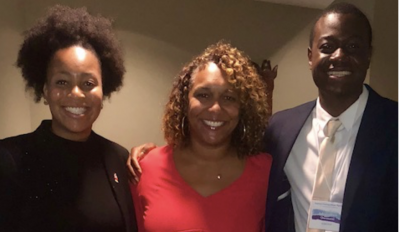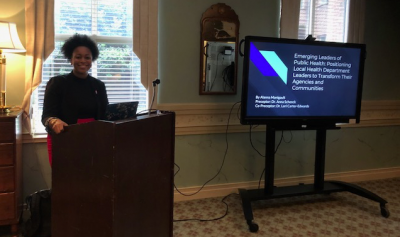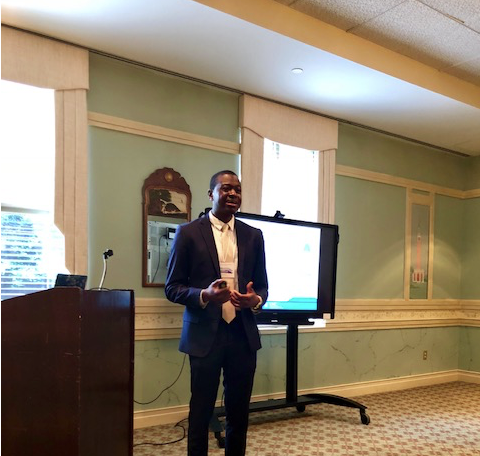Training the Next Generation of Leaders: Project IMHOTEP

Dana Rice, DrPH (center) poses with her mentees Alanna Manigault (left) and Adetomiwa Owoseni (right) who both participated in Project Imhotep, an 11-week public health internship.
Each year, talented undergraduate students from dozens of universities gather at UNC-Chapel Hill to conduct research under the mentorship of Carolina’s faculty, staff, graduate students, and postdoctoral scholars. One such program is Project IMHOTEP. Named after an ancient Egyptian scholar, Project IMHOTEP is an 11-week public health internship for undergraduate juniors, seniors, and recent graduates. The program aims to increase diversity in the public health field by engaging underrepresented minority students. Project IMHOTEP has a special connection to UNC Gillings. Bill Jenkins, PhD, MPH, who founded the program, received his master’s in public health degree and a Doctor of Philosophy degree in Epidemiology from the University of North Carolina at Chapel Hill.
Participants in Project IMHOTEP undergo two weeks of intensive academic training at Morehouse College in Atlanta, GA. During the trainings, students hone their knowledge and skills in biostatistics, epidemiology, and occupational safety and health. Following the training, the participants spend nine weeks working on a hands-on public health research project at a partner academic institution. PHLP had the pleasure of hosting the following three students in the program: Jason House of Tennessee State Univerity; Alanna Manigault of Hampton University; Adetomiwa Owoseni of Howard University. Read more about the student’s research below.
Jason House
Title: Faith-Based Organizational Network (FBON) Workshop
Mentor: Lori-Carter Edwards
North Carolina serves as a leader in conducting faith-based interventions and is primed to build a network of Faith Based Organizations (FBOs) to collectively address health needs in resource-challenged communities. North Carolina is located in the Bible Belt, meaning these FBOs can be significant influencers and health promoters in their communities. The emphasis on faith-based organizations as sources for promoting health programs and interventions, particularly in Black communities is indisputable.
The objective of the Faith-Based Organizational Network Workshop is to strategically develop a workshop to clarify the strengths and challenges in building sustainable networks to promote community health. The Workshop framework addresses four areas for discussion and activities: 1) network governance and infrastructure; 2) FBO and network readiness in promoting health; 3) sustainable health programming within FBOs and 4) social entrepreneurship. Previous research around Faith-Based Organizational Networks (FBON) led to the emergences of three main objectives: 1) Identify critical success factors using measurable objectives; 2) Identify resource sharing as a core competency of the FBO Network; and 3) strengthen capacity within the network by assessing and understanding each member’s unique role in their communities. The ultimate goal of this workshop is for these FBOs to be able to successfully and effectively build leadership capacity in order to sustain a Faith-Based Organizational Network (FBON).

Alanna Manigault presenting her final project
Alanna Manigault
Title: Emerging Leaders of Public Health: Positioning Local Health Department Leaders to Transform Their Agencies and Communities
Mentors: Anna Schenck; Lori Carter-Edwards
Effective leadership training has the power to significantly improve the success of health care systems. Although the transformation of local communities is integral to advancing health equity, many leaders are not equipped with the skill set to do so. The Emerging Leaders of Public Health program (ELPH) is an initiative sponsored by the Kresge Foundation targeting local public health agencies. The National Program Office (NPO) of ELPH is housed at the University of North Carolina Gillings School of Global Public Health, which provides education, training technical assistance, and support to public health practitioners.
The objective of this study is to assess data from the bi-monthly technical assistance calls between the NPO staff and the two-person leadership teams to examine their successes, challenges, and next steps recommended by the NPO team. We collaborated with the technical assistance call facilitators to establish four domains for assessing calls: leadership development, team dynamics, general progress, and resources. The study used data collected on Cohort II of ELPH, which consists of 20 teams from local health departments throughout the country. Each team began with a different transformative concept, as well as varying years of experience in a public leadership role. The results evaluate the progress of each team by domain over the course of the initiative. The data will be used to inform the training of leaders in ELPH, as well as future initiative by the Kresge Foundation.

Adetomiwa Owoseni presenting his final project
Adetomiwa Owoseni
Title: Assessment of a Technological Intervention to Promote Real-Time Screening and Referrals to HIV Medication for Uninsured Patients
Mentors: Dana Rice; Allison Mathews
Numerous barriers exist for uninsured, low-income communities to access HIV preventative medication and treatment services. These barriers include the inability of uninsured patients to pay for medications, a lack of knowledge of the proper channels to access free and reduced-cost medications, and the burden providers experience with paperwork necessary to complete applications for patient assistance programs on behalf of patients. There is a need to develop a technological intervention to streamline linkage to HIV care, both for people seeking services and service providers. The purpose of this study is to assess the acceptability of Digital LinCS as a technological intervention to increase linkage to care for people affected by HIV/AIDS in Durham, NC.
Methods: To understand the platform acceptability, we conducted cognitive interviews with African American stakeholders aged 18 years and older living in Durham, NC. Digital LinCS is an online platform that matches and connects people seeking services to patient assistance programs. Results: Interviews with six stakeholders included three people living with HIV, one HIV test provider and two PrEP navigators. Participants included three women and three men, ranging in age from 28 to 54 years old. Preliminary results reveal that most participants demonstrate a likelihood to use the platform. For aesthetics, participants living with HIV preferred bold rather than muted colors. Most participants found the functionality of the platform to be acceptable. The majority of negative feedback focused on changing site wording to promote user empowerment while completing the eligibility survey. Conclusion: Future research should examine ways to incorporate community-based feedback into HIV-related technological interventions to encourage human-centered design and culturally relevant messaging.
